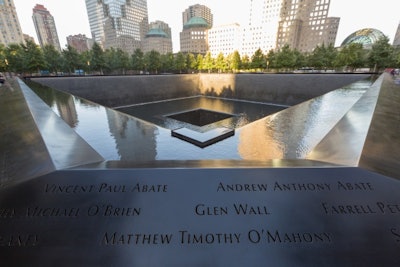Twenty-two years on, the memories don’t come quite as readily as they once did for Dr. Lynne Brown. But some aspects of 9/11 are indelible.
Brown, who was vice president of government relations and public affairs for New York University (NYU) on that day, climbed to the roof of Bobst Library when she heard that an airplane had hit the World Trade Center. She remembers the charred hole in the building, with smoke beginning to come out. She remembers the smell—acrid and rancid. And she remembers the sound that she heard as the towers collapsed—hundreds of people in a collective moan.
 The 9/11 Memorial in New York City
The 9/11 Memorial in New York City
“[9/11] is just this mystical thing I’ve always heard about,” said Evangelica Alcantara, a first-year student at Riverside City College who was born in 2001. “I don’t have very much connection to it.”
For Alcantara, the largest impact of 9/11 that she witnessed was the treatment of her best friend growing up, who was a Muslim.
“She had to face discrimination,” said Alcantara. “They would blame her for 9/11 even though she wasn’t born yet.”
Jocelyn Gordilla, a third-year at the University of California, Riverside (UC-R), shares the sense that there was an increase in hatred.
“Everybody just kind of felt uneasy all the time,” she said. “Everyone was on edge.”
Gordilla thinks that the impact of 9/11 on her personally has been small. She described the attacks as “a little rock in my pouch that can hold me down if I let it. It’s a little weight on my shoulder.”
And although she doesn’t feel much of a personal connection to 9/11, she’s skeptical of the official explanation.
“I’ve heard that our government kind of knew what was going on, but they didn’t really stop anything,” Gordilla said. “That way they could impose war for financial gain.”
Neither Alcantara nor Gordilla was sure if their schools had any plans to mark the anniversary of 9/11. Gordilla remembers that UC-R had done social media posts in the past. She says that she reads them, “because they’re pretty short.”
“It’s just a little ‘remember those who have died for us, the firefighters, police, the victims in the buildings and on the planes,’” she said.
However, Gordilla isn’t interested in an in-person memorial ceremony.
“You can only do so much,” she said. “They’re not here, [so] how is it going to benefit them if we’re standing there with a candle? We need more things that help, not things that say, ‘remember when this bad thing happened?’”
Dr. Marita Sturken is a professor of media, culture, and communication at NYU, who teaches about 9/11 as a case study of memorialization and as a global media event. She says that, for many current undergraduates, 9/11 feels as if it took place in an entirely different era.
 Dr. Marita Sturken, professor of media, culture, and communication at NYU
Dr. Marita Sturken, professor of media, culture, and communication at NYU
For these students, the political turmoil of the past few years feels far more relevant than 9/11.
“They don’t see it as having the same level of historical importance that other generations do,” said Sturken. “That’s understandable. They’re living their formative years in an extremely chaotic kind of permanent crisis.”
Brown, who retired last fall, did not interact with many students who didn’t remember 9/11. She’s not sure how much they know about it.
“I bet if we ask them what it was about, I might be unnerved by the answer,” she said.
Brown thinks that, as firsthand memories of the attacks fade, something is being lost.
“You forget your vulnerability,” she said, “You forget how important it is to pull together. You lose perspective on what you can come back from, how resilient [you are].”
She notes that younger people are feeling less resilient these days, more anxious, more worried about life.
But Sturken is less concerned.
“I think this is a very normal process of events shifting into a new terrain as time recedes,” she said. “It’s a necessary process. In the immediate aftermath of an event like that, we tend to have a more visceral, exaggerated sense of how it’s changing the world.”
Sturken believes that it’s critical to educate students about 9/11, but says that she has found them to be eager to learn.
“Is something lost in them not having any first-hand experience of [9/11]? I suppose, but that’s life,” she said. “They are just as capable of thinking of it as a historical event with meaning. It’s just a different kind of engagement.”
Jon Edelman can be reached at [email protected]


![Mentor Mentee [60287]](https://img.diverseeducation.com/files/base/diverse/all/image/2024/04/Mentor_mentee__60287_.662959db8fddb.png?auto=format%2Ccompress&fit=crop&h=100&q=70&w=100)


















